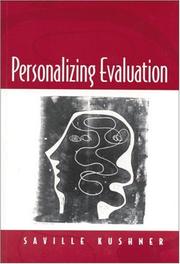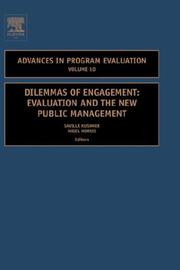| Listing 1 - 9 of 9 |
Sort by
|

ISBN: 0761963626 0761963618 1849209553 1848609116 0585384835 9780761963622 Year: 2000 Publisher: London Sage
Abstract | Keywords | Export | Availability | Bookmark
 Loading...
Loading...Choose an application
- Reference Manager
- EndNote
- RefWorks (Direct export to RefWorks)
Personalizing Evaluation challenges the mainstream approach to program evaluation by inverting the traditional relationship between program and person. Saville Kushner shows how evaluation should document individual and group experience and use this as a lens through which to read social programs and to measure their significance in people's lives. He uses a wealth of examples and case studies to illustrate how a deeper understanding of program evaluation can be achieved across a range of issues and applications. The book addresses three principal concerns that are at the heart of the evaluation process: how to learn about evaluation in ways which are related to the often confusing and messy experience of doing it; how to understand the role of evaluation as a form of personal expression and, even, political action; and how to use evaluation to say something about people's lives as well as about the programs and institutions people are involved in.
#SBIB:303H60 --- #SBIB:303H30 --- #SBIB:003.IO --- Bijzondere methoden: algemeen --- Kwalitatieve methoden: algemeen --- Educational evaluation --- Educational assessment --- Educational program evaluation --- Evaluation research in education --- Instructional systems analysis --- Program evaluation in education --- Self-evaluation in education --- Evaluation
Book
ISBN: 1681236907 9781681236902 9781681236889 9781681236896 1681236893 1681236885 9781681236889 Year: 2017 Publisher: Charlotte, NC : Information Age Publishing, Incorporated,
Abstract | Keywords | Export | Availability | Bookmark
 Loading...
Loading...Choose an application
- Reference Manager
- EndNote
- RefWorks (Direct export to RefWorks)
Plaintext description.
Research --- Research ethics --- Methodology. --- Evaluation. --- Moral and ethical aspects.
Book
ISBN: 9781849209557 Year: 2000 Publisher: London : SAGE,
Abstract | Keywords | Export | Availability | Bookmark
 Loading...
Loading...Choose an application
- Reference Manager
- EndNote
- RefWorks (Direct export to RefWorks)
Saville Kushner shows how evaluation should document individual and group experience. This can then be used to measure the significance of social programs in people's lives.

ISBN: 9780762313426 Year: 2007 Publisher: Amsterdam Elsevier/JAI
Abstract | Keywords | Export | Availability | Bookmark
 Loading...
Loading...Choose an application
- Reference Manager
- EndNote
- RefWorks (Direct export to RefWorks)
Yearbooks --- Arbeids- en organisatiepsychologie --- management --- management.

ISBN: 9781849504393 1849504393 0762313420 9786611023799 1281023795 0080524273 9780080524276 9780762313426 Year: 2009 Publisher: Bingley Emerald Group Publishing Limited
Abstract | Keywords | Export | Availability | Bookmark
 Loading...
Loading...Choose an application
- Reference Manager
- EndNote
- RefWorks (Direct export to RefWorks)
In our reforming public institutions it sometimes feels as though the very ground of social and political contracts is shifting. The economic revolution embraced by neo-liberals and neo-conservatives is paralleled by a governance revolution in those same institutions which were designed to protect us from historical swings and ideological roundabouts. Our public institutions - for the most part the public sector and its professional groups - in the eyes of some provided stability, while for others they were a brake on change. Now, however, they have become conduits for political change and reform. We live in an institutional world now dubbed the New Public Management (NPM). In this new landscape evaluators might have to think afresh about how to position ourselves in relation to institutional ethics and the pursuit of social justice. In this volume contributors give us a start in thinking through such a repositioning, some within the values framework of NPM, others as external observers.
Evaluation research (Social action programs) --- Social sciences --- Social science research --- Evaluation of social action programs --- Evaluative research (Social action programs) --- Evaluation --- Social action --- Social service --- Research. --- Research --- Public administration. --- Political Science --- Public Affairs & Administration.
Book
ISBN: 184391347X Year: 2013 Publisher: London : Hesperus Press,
Abstract | Keywords | Export | Availability | Bookmark
 Loading...
Loading...Choose an application
- Reference Manager
- EndNote
- RefWorks (Direct export to RefWorks)
Who Needs the Cuts? Myths of the Economic Crisis by Barry Kushner and Saville Kushner examines the narrative surrounding economic austerity measures implemented in the UK following the 2008 financial crisis. The authors critique the government's rationale for public sector spending cuts, arguing that the narrative of debt and deficit has been constructed to instill fear and justify severe economic policies. The book explores how this narrative gained traction among the public, comparing it to historical instances of fear-driven policy-making. Intended for readers interested in economic policy and political discourse, the book challenges the prevailing economic assumptions and calls for a reevaluation of austerity measures.
Book
ISBN: 1781907056 1781907048 1306291100 9781781907054 9781781907047 9781306291101 Year: 2013 Publisher: Bingley, United Kingdom : Emerald,
Abstract | Keywords | Export | Availability | Bookmark
 Loading...
Loading...Choose an application
- Reference Manager
- EndNote
- RefWorks (Direct export to RefWorks)
Current conventions in school evaluation focus on accountability, control and compliance. New Zealand offers a distinctive, systemic alternative to school self-evaluation, with developmental and negotiated approaches ingrained throughout the education system, from school inspection to major government schooling improvement initiatives. In New Zealand there is no national testing, other than a Ministry-sponsored (voluntary) formative assessment system designed for school and teacher self-evaluation. This is a form of professional and program evaluation where there is shared power and responsibility between evaluators and those being evaluated. Through a detailed national case study of New Zealand, together with commentaries from international specialists, this volume examines the successes and challenges of this approach to programme evaluation and its generalizability to other educational and professional review settings, and show how education systems can recover a balance between an achievement agenda and a focus on educational quality.
Educational evaluation. --- Educational assessment --- Educational program evaluation --- Evaluation research in education --- Instructional systems analysis --- Program evaluation in education --- Self-evaluation in education --- Evaluation --- Education --- Organization & management of education. --- Examinations & assessment. --- Curricula. --- Testing & Measurement. --- Educational Policy & Reform --- General.
Book
ISBN: 1784410632 1784410640 9781784410636 9781784410643 Year: 2015 Publisher: United Kingdom : Emerald,
Abstract | Keywords | Export | Availability | Bookmark
 Loading...
Loading...Choose an application
- Reference Manager
- EndNote
- RefWorks (Direct export to RefWorks)
In todays world, with its preoccupation with impact assessments and results-based management, program evaluation is all too often framed as an affirmation of an official narrative rather than as a source of alternatives. The power of case study is its insistence on opening up rather than suppressing the complexity of social programs, on documenting multiple voices and exploring contested viewpoints. In this way, case study resists the trend towards evaluations that simply focus on what works, that reduce the complexity of social life to a single narrative, and to formulations that strip out most of what matters. Now more than ever, as government policies and programs orientate to global economic crisis and its impact on the lives of citizens and communities, we require evaluations that resist information loss and produce richness.
Research --- Education --- Methodology. --- Evaluation. --- Educational strategies & policy. --- Education. --- General. --- Case method
Book
ISBN: 0904510107 Year: 1982 Publisher: Norwich : University of East Anglia, Centre for Applied Research in Education,
Abstract | Keywords | Export | Availability | Bookmark
 Loading...
Loading...Choose an application
- Reference Manager
- EndNote
- RefWorks (Direct export to RefWorks)
| Listing 1 - 9 of 9 |
Sort by
|

 Search
Search Feedback
Feedback About UniCat
About UniCat  Help
Help News
News